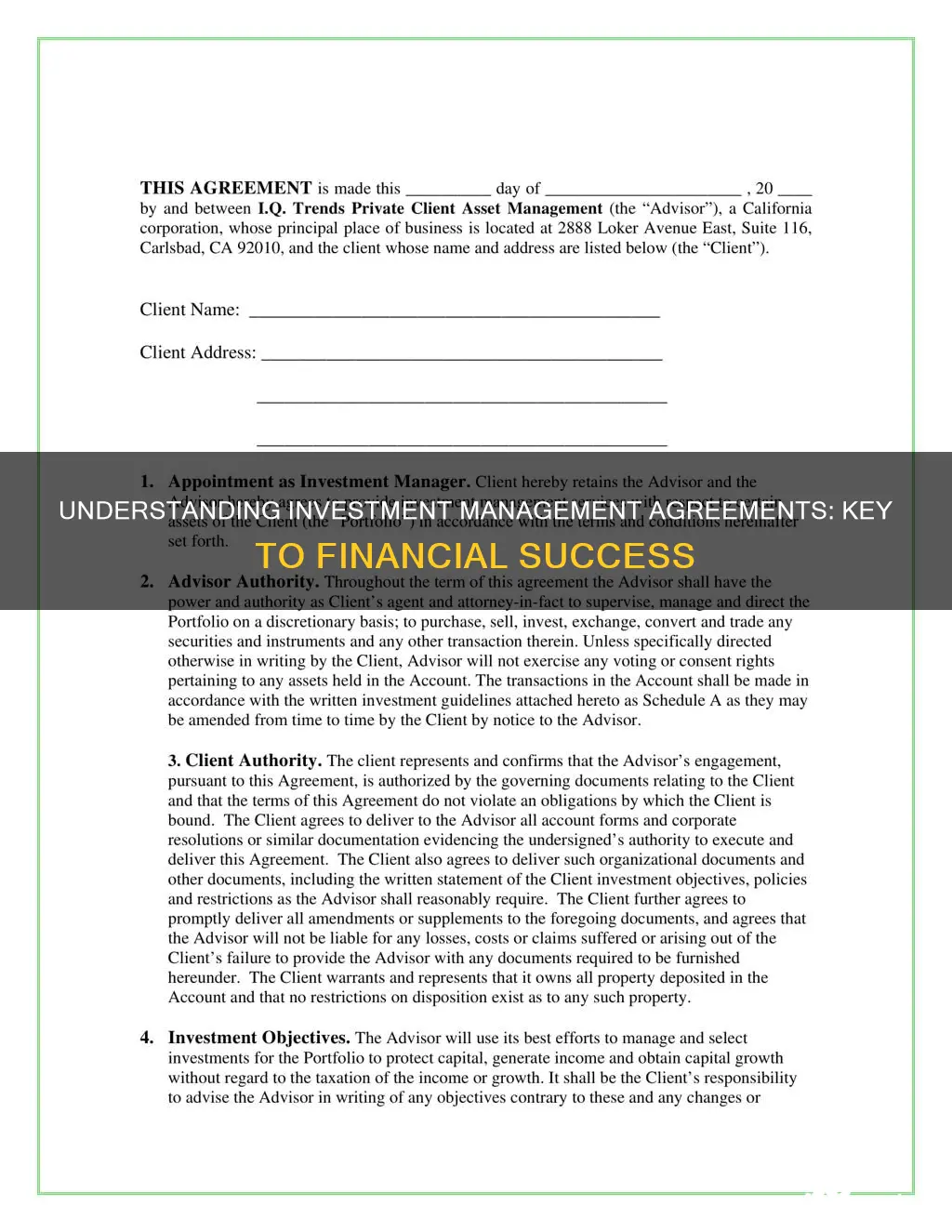
An Investment Management Agreement (IMA) is a formal arrangement between a financial adviser and an investor. It stipulates the terms under which the adviser is authorised to act on behalf of the investor to manage the assets listed in the agreement. The agreement sets out the terms and conditions by which a fund vehicle agrees to pay advisory and management fees and out-of-pocket expenses to the investment manager entity. It includes common provisions, such as management fees, scope of activities, and indemnification of the manager.
| Characteristics | Values |
|---|---|
| Purpose | Facilitate the implementation of the investment fund's strategies |
| Appointment | The investment fund appoints the investment manager as investment adviser with respect to the fund's assets |
| Authority and Duties | The investment manager agrees to furnish an investment program for the fund, including the investment and reinvestment of the fund's assets, determining what investments will be purchased, held, sold or exchanged, and supervising and arranging the day-to-day operations of the fund |
| Voting Power | The investment manager has no authority to exercise voting power with respect to the fund's portfolio holdings unless expressly delegated by the fund |
| Compliance | The investment manager agrees to discharge its responsibilities under the agreement in accordance with the terms, investment objectives, policies, guidelines, and restrictions of the fund, as well as applicable laws and regulations |
| Sub-Advisers | The investment manager may delegate duties to sub-advisers or administrators, but remains responsible for overseeing the provision of delegated services and bearing the costs |
| Management Fee | The fund pays a management fee to the investment manager, typically calculated as a percentage of the fund's average daily net assets |
| Expenses | The investment manager is responsible for its own operating and overhead expenses, while the fund bears its own expenses, including management fees, risk management expenses, investment expenses, legal expenses, and accounting and auditing expenses |
| Brokerage | The investment manager is responsible for placing orders for the execution of securities transactions with brokers or dealers, considering factors such as price, the size of the transaction, and the reputation of the broker or dealer |
| Exclusivity | The investment manager is free to render similar services to other clients, and may need to make allocation decisions between the fund and other accounts |
| Indemnification | The fund agrees to indemnify and hold harmless the investment manager and its affiliates from liabilities, damages, losses, and expenses arising out of the performance of the investment manager's responsibilities, except in cases of willful misfeasance, bad faith, gross negligence, or reckless disregard of duties |
| Relationship | The investment manager is an independent contractor and not an employee or dependent agent of the fund |
| Term and Termination | The agreement specifies the term, typically with provisions for renewal, and outlines the process for termination by either party |
| Amendment | The agreement can be amended or modified only through a written document signed by both parties |
What You'll Learn

Investment Management Agreement (IMA) definition
An Investment Management Agreement (IMA) is a formal arrangement between a financial adviser and an investor. The agreement stipulates the terms under which the adviser is authorised to act on behalf of the investor to manage the assets listed in the agreement.
An IMA is typically made between a private equity fund and an investment manager that is an affiliate of the general partner (or equivalent) of the fund. The agreement sets out the terms and conditions by which a fund vehicle agrees to pay advisory and management fees and out-of-pocket expenses to the investment manager entity.
An IMA includes common provisions, such as management fees, the scope of activities, and indemnification of the manager. The agreement may also cover the appointment of the investment manager, the authority and duties of the investment manager, and the term, termination, and renewal of the agreement.
For example, in an IMA between BLACKSTONE ALTERNATIVE MULTI-MANAGER SUB FUND IV L.L.C. and BLACKSTONE ALTERNATIVE INVESTMENT ADVISORS LLC, the fund appoints the investment manager as its investment adviser with respect to the fund's assets for the period and on the terms set forth in the agreement. The investment manager agrees to furnish an investment program for the fund, manage the investment and reinvestment of the fund's assets, and determine what investments will be purchased, held, sold, or exchanged by the fund. The agreement also includes provisions regarding the investment manager's authority, fees, and liabilities.
Brexit-Proof Your Investment Portfolio: Strategies for Volatile Markets
You may want to see also

Investment manager's authority and duties
Investment managers are given a wide range of authority and duties under an Investment Management Agreement (IMA). The IMA is a formal arrangement between a financial adviser and an investor that stipulates the terms under which the adviser is authorised to act on behalf of the investor to manage the assets listed in the agreement.
The investment manager is authorised to supervise and direct the investment and reinvestment of assets in the account, subject to the limitations set out in the agreement. They can buy, sell, exchange, convert and otherwise invest or trade in stocks, bonds, options, units and other securities, including money market instruments, at their discretion. They also have the power to execute any documentation and make investment decisions as they see fit, within the parameters of the agreement.
The investment manager is also responsible for selecting brokers or dealers to execute securities transactions and can negotiate their commission. They are obliged to act in good faith and with a degree of care, skill and diligence. They are also responsible for furnishing reports and other information to the client and adhering to confidentiality agreements.
The IMA will outline the fees and expenses to be paid by the client to the investment manager for their services. The agreement can be terminated by either party, usually with written notice, and will include provisions for the survival of certain sections of the agreement post-termination.
Saving's Leakage and Planned Investment: A Balancing Act
You may want to see also

Investment manager compensation
Investment management agreements (IMAs) are legal documents that give investment managers the authority to manage capital on behalf of investors. They outline the terms and conditions under which an investor will pay for advisory and management fees, out-of-pocket expenses, and other services provided by the investment manager.
The investment manager's compensation is typically specified in an appendix to the IMA. The management fee is usually calculated as a percentage of the fund's average daily net assets and accrued daily, payable quarterly. The fee may be prorated if the investment manager is not acting as such for an entire calendar quarter.
The investment manager is generally responsible for their own operating and overhead expenses, such as salaries, bonuses, rent, office expenses, and auditing expenses. However, the fund typically covers other expenses, such as legal and administrative costs, brokerage costs, consulting fees, and expenses related to regulatory compliance.
In addition to the management fee, the investment manager may also receive compensation in the form of higher brokerage commissions for brokerage and research services. This is allowed as long as the investment manager determines in good faith that the commission is reasonable in relation to the value of the services provided.
The investment manager is also usually authorised to engage external legal counsel to review trade-related documentation and charge the account for these costs.
The IMA should also specify the type and frequency of written or verbal reports provided by the investment manager, typically issued quarterly, and cover the terms and conditions surrounding reporting methods and intervals.
Investing Wisely: Choosing the Right Portfolio for You
You may want to see also

Client's authority to modify guidelines
An Investment Management Agreement (IMA) is a formal arrangement between a financial adviser and an investor. The agreement stipulates the terms under which the adviser is authorised to act on behalf of the investor to manage the assets listed in the agreement.
The client has the right at all times to modify the guidelines or give instructions to the investment manager (known as "Instructions") to buy, sell or retain any investment. However, no modification of the guidelines and no instructions or modifications of instructions will be binding on the investment manager unless they have received written notice of them from an authorised person.
The investment manager will have a reasonable period to bring the account into compliance with any changes to the guidelines. The guidelines and all instructions, unless they expressly provide otherwise, will continue to be effective until duly cancelled by subsequent modifications duly communicated to the investment manager in writing.
The client shall have the sole authority and power to engage the investment manager under the terms and conditions of the IMA. Such engagement does not violate the client's constituent documents, any other material agreement, order or judgment of any court or governmental authority, or any law applicable to the client.
The client will also be responsible for notifying the investment manager of any increase or reduction in the amount of the account's assets subject to the manager's investment direction.
Savings vs. Investments: What's the Difference?
You may want to see also

Investment manager's liability
Investment management agreements (IMAs) are legal documents that give investment managers the authority to manage capital on behalf of investors. They outline the terms and conditions under which an investor will invest in a shared vehicle and pay investment management service fees and direct expenses.
Investment Managers' Liability
IMAs outline the duties and liabilities of investment managers. A breach in these duties can result in the investment manager being held liable for the management of a client's investment portfolio.
Fiduciary Duty
A fiduciary duty arises from the relationship of trust and confidence between the investor(s) and the investment manager. The investment manager must put the interests of the investor(s) ahead of its own financial and commercial interests. A breach of fiduciary duty can occur if an investment manager advises on or makes an investment that is not in the best interests of the investor(s).
Duty of Care
Investment managers have a duty to act with reasonable skill and care when managing assets for investors. This includes conducting thorough research and analysis before making investment decisions. A failure to do so, resulting in financial loss for the investor, can lead to the investment manager being held liable.
Transparency and Conflicts of Interest
Investment managers must be transparent with investors about the fees they propose to charge on an acquisition. They are also under a duty not to make secret profits from arranging transactions. Additionally, investment managers should fairly manage any potential conflicts between their interests and those of the investor(s).
Individual Liability
In certain cases, individuals within an investment management company can be held liable if they are found to have induced a breach of contract or a breach of fiduciary duty by the investment manager.
Indemnification
IMAs often include provisions for indemnification, which protect investment managers from liability for losses or damages incurred while performing their duties, provided they have acted in good faith and without negligence or misconduct.
It is important to note that the specific liabilities and protections for investment managers can vary depending on the jurisdiction and the terms outlined in the IMA.
Building an Australian Investment Portfolio: Strategies for Success
You may want to see also
Frequently asked questions
An Investment Management Agreement (IMA) is a formal arrangement between a financial adviser and an investor. The agreement outlines the terms under which the adviser is authorised to act on behalf of the investor to manage the assets listed in the agreement.
An Investment Management Agreement includes the management fees, scope of activities, and indemnification of the manager. It also includes the investment objectives of the client and any specific investment restrictions applicable to the management of the account.
The purpose of an Investment Management Agreement is to set out the terms and conditions under which a fund vehicle agrees to pay advisory and management fees and expenses to the investment manager entity. It also authorises the investment manager to make decisions on behalf of the investor regarding the assets listed in the agreement.
The parties involved in an Investment Management Agreement are the financial adviser or investment manager and the investor or client. The investment manager is appointed to manage the client's assets and make investment decisions on their behalf, within the agreed-upon guidelines and restrictions.







